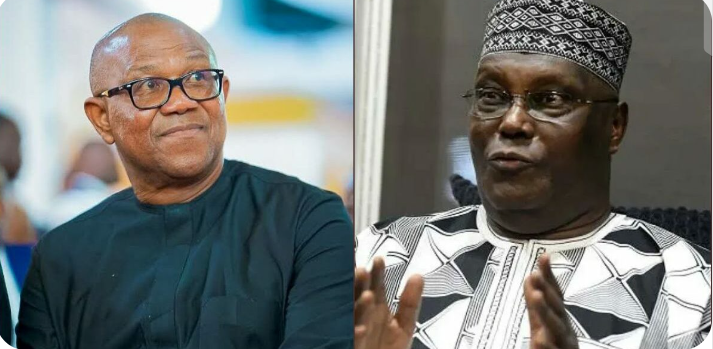
POLITICS: PETER OBI WEIGHS IN ON 2027 ALLIANCE RUMORS WITH ATIKU

The political landscape in Nigeria is abuzz with speculation about a possible alliance between former Labour Party presidential candidate Peter Obi and former Vice President Atiku Abubakar ahead of the 2027 general elections.
Peter Obi, a prominent figure in Nigerian politics, has addressed the growing rumors about a potential political alliance with Atiku.
Speaking during a public appearance in Kubwa, Abuja, Obi offered a measured response to journalists' questions about the alleged alliance.
"You can make of the report what you want. But I'm in a coalition against bad governance, hunger, and poverty," Obi said, neither confirming nor denying the rumoured alliance.
Obi's comments come amid reports that Atiku has offered him the vice-presidential slot under a power-sharing agreement for 2027.
The proposed alliance is said to be part of a one-term presidency arrangement, with Obi potentially serving as Atiku's running mate.
While Obi's response to the rumors was cautious, his comments suggest that he is open to working with like-minded individuals and groups to challenge the current government's policies and practices.
The rumored alliance between Obi and Atiku has generated significant interest and debate among Nigerians, with some hailing it as a potential game-changer in the country's politics.
Others have expressed skepticism about the feasibility and implications of such an alliance.
Regardless of the outcome, the speculation surrounding the potential alliance highlights the complexities and nuances of Nigerian politics.
As the country approaches the 2027 general elections, politicians and parties are positioning themselves for what promises to be a highly contested and unpredictable electoral contest.
The stakes are high, and the outcome will likely have significant implications for Nigeria's future.
In this context, Obi's comments can be seen as a strategic move to keep his options open while also emphasizing his commitment to fighting against bad governance, hunger, and poverty.
By framing his potential alliance with Atiku as part of a broader coalition against these issues, Obi is attempting to appeal to a wide range of Nigerians who are dissatisfied with the current state of affairs.
Ultimately, the success of any potential alliance between Obi and Atiku will depend on a variety of factors, including their ability to mobilize support, articulate a compelling vision for Nigeria's future, and navigate the complex web of alliances and rivalries that define the country's politics.
As the political landscape continues to evolve, one thing is clear: the stakes are high, and the outcome will likely have far-reaching implications for Nigeria's future.
In the meantime, Nigerians will be watching with great interest to see how Obi and Atiku navigate the complex world of politics and whether their potential alliance will come to fruition.
The rumored alliance has sparked a flurry of reactions on social media, with some users expressing support for the potential partnership.
Others have been more critical, questioning the motivations behind the alleged alliance and expressing skepticism about its potential impact.
As the debate continues, one thing is certain: the politics of Nigeria are about to get a lot more interesting.
With the 2027 general elections on the horizon, politicians and parties are gearing up for what promises to be a highly contested and unpredictable electoral contest.
The outcome will likely have significant implications for Nigeria's future, and the rumored alliance between Obi and Atiku is just one of many factors that will shape the country's politics in the months and years to come.
In conclusion, Peter Obi's response to the rumors about a potential alliance with Atiku Abubakar has sparked a lively debate about the future of Nigerian politics.
While the outcome of the rumored alliance remains uncertain, one thing is clear: the stakes are high, and the implications will be far-reaching.


